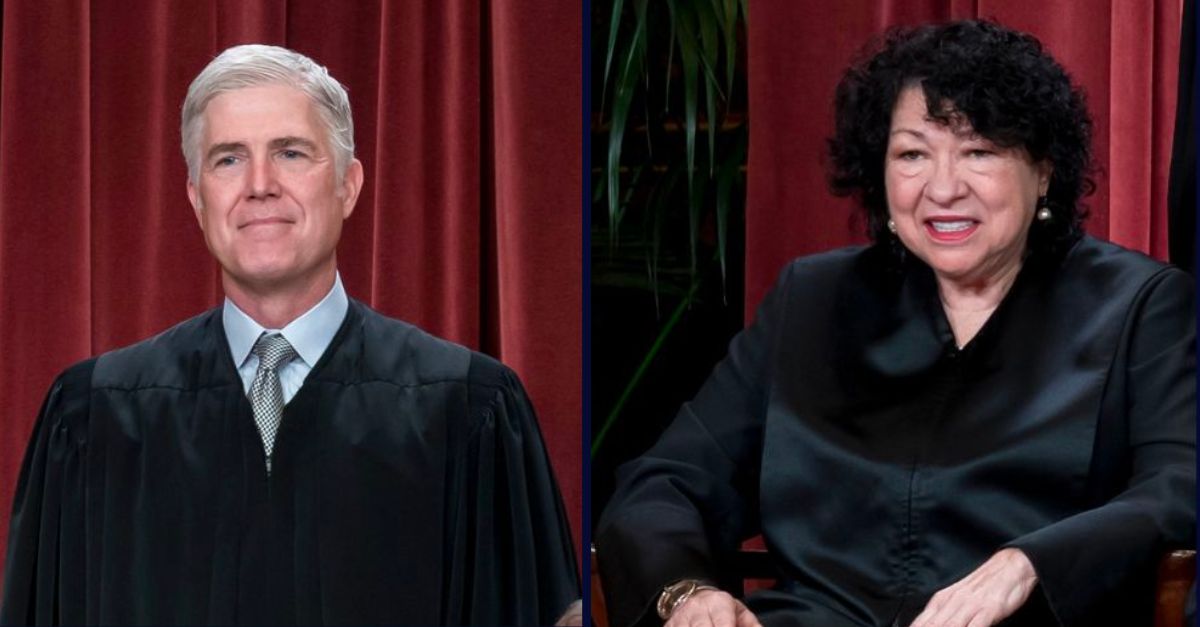
Left: Justice Neil Gorsuch. Right: Justice Sonia Sotomayor (Erin Schaff-Pool/Getty Images)
The Supreme Court of the United States heard oral arguments Monday in Culley v. Marshall, a case in which litigants asked the justices to clarify what procedure is due to “innocent owners” and others who fight back against the seizure of personal property by state governments.
The proceedings brought together two justices typically known for their divergent views: the liberal Justice Sonia Sotomayor, appointed by Barack Obama, and the Donald Trump-appointed small-government proponent Justice Neil Gorsuch. Though the two have found themselves on opposite sides of many rulings, questions about the procedural safeguards necessary to protect against government overreach in asset forfeiture gave the two a rare — though not entirely unprecedented — moment of common ground.
The dispute before the Court involves two Alabama women whose cars were seized by police while someone else was driving. Halima Culley’s son was pulled over by police and charged with possession of marijuana and drug paraphernalia. The car was registered to Halima Culley, and although she was not implicated in the drug case, she went without her car for 20 months before finally prevailing on summary judgment on an “innocent owner” claim.
Likewise, Lena Sutton lent her car to a friend to run an errand. The friend was pulled over by police, then arrested after a search of the vehicle turned up methamphetamine. Like Culley, Sutton asserted and succeeded in proving an innocent owner claim — but not before over a year had passed.
Neither Culley nor Sutton were found to have committed any wrongdoing, but both women were deprived of the use of their cars for lengthy periods of time. They each raised claims under 42 U.S.C. § 1983, asserting that Alabama’s failure to provide them a prompt hearing constituted a violation of their civil rights that caused them significant hardship.
One advocacy group that urged the Supreme Court to take up the case called Alabama’s forfeiture “a modern-day form of highway robbery which empowers police to seize and keep private property (cash, jewelry, cars, homes and other valuables) they ‘suspect’ may be connected to a crime.”
Now, the justices have been called upon to decide whether Culley, Sutton, and others similarly situated are entitled to a “retention hearing” that could accelerate the process of returning seized property. Much of the discussion Monday related to various questions about which analytical framework should be applied to assess the procedures required for civil forfeiture.
Early in the proceedings, an unusual duo emerged. Sotomayor and Gorsuch — benchmates who occupy very different portions of the ideological spectrum — were united in being overtly critical about government abuses of the forfeiture system as well as overtly skeptical as to whether the case currently before the Court was really the correct one to address any underlying unfairness.
Gorsuch began his colloquy with Shay Dvoretzky, Culley and Sutton’s lawyer, by offering some pointed comments.
Gorsuch deemed the question presented by the lawyers “weird,” and suggested that instead of asking which analytical framework should apply, the justices should actually be considering whether this particular case is an appropriate vehicle to consider these questions at all.
“Whatever test you apply, clearly there are some jurisdictions that are using civil forfeiture as funding mechanisms,” charged Gorsuch, then provided an example of a jurisdiction that would agree to giving someone their car back, but only after requiring an individual to jump through impossible procedural hoops.
“That is happening out there,” said a knowing Gorsuch about states that misuse forfeiture. Though the justice qualified, “But I’ll be honest — it didn’t look to me that that was the case in Alabama.”
Gorsuch explained that because Culley and Sutton each waited substantial amounts of time to file their cases, but theoretically could have filed earlier, their present appeal might be lacking.
“What would have impaired them from filing a summary judgment motion on day one?” asked Gorsuch. “They know the facts of the ownership of their car and how it was misused,” he continued, then commented that he was “sympathetic” to their claims, but unconvinced that the case was “right.”
Read Related Also: Pennsy Mom Accused of Hanging Her Children in the Basement Has Plea Hearing Scheduled
When it was her turn to speak, Sotomayor picked up on Gorsuch’s skepticism.
“Bad facts make bad law, and I fear we may be headed that way,” she warned, then said Gorsuch “started with the right question.”
The two justices appeared to be of one mind as to the problems with police asset forfeiture.
“We know there are abuses of the forfeiture system,” Sotomayor said, “We know because it’s been documented repeatedly throughout the country.”
“The incentive is that police are given to seize property to keep its value, as opposed to issues of probable cause or issues of legitimacy of the seizure,” she explained and said that this incentive “has often led to months if not years of retention of property that ultimately gets returned to the owner” in cases involving innocent owners.
Sotomayor worried that an incorrect decision could foreclose the chance to correct a potentially abusive system.
When Gorsuch turned to question Alabama Solicitor General Edmund LaCour, the justice again raised the necessity of protecting individuals.
Gorsuch said the procedure guaranteed people like Culley and Sutton must “have some robustness to it” to protect them from “attempts to create processes that are deeply unfair in order to retain the property for the coffers of the state.” The justice politely clarified to LaCour that he was not specifically accusing Alabama of such misconduct.
LaCour pushed back against Gorsuch’s inquiries, arguing that the risk of returning property to criminals for use in further criminal actions weighs against affording individuals too much process.
Sotomayor, however, countered this point with logic of her own. Ever the realist, the justice pointed out that criminals are unlikely to initiate further court action. Rather, she said, the people who would most likely be served by due process guarantees in forfeiture cases are those who, like Culley and Sutton, have valid “innocent owner” claims.
When Assistant to the Solicitor General Nicole Reaves took the podium on behalf of the Department of Justice, which joined the case as amicus curiae in support of Alabama’s position, Sotomayor still appeared unconvinced by the state’s argument. The justice remarked that 2021 changes to Alabama forfeiture law that strengthened safeguards against civil forfeiture clarify the need that better procedures were necessary.
“It’s quite interesting, isn’t it,” remarked the justice about the recent changes, “that once the incentive is taken out of police officers taking advantage of the system as it exists that Alabama puts in a system that is much fairer.”
“That is one of the reasons that Alabama resisted our granting cert in this case,” Sotomayor contextualized, “because the new system does look to guarantee a faster process.”
While the Supreme Court could hand down a ruling that would require increased safeguarding against civil forfeiture, the justices could toss the case on the preliminary issue of standing. That is, the Court could rule that because Culley and Sutton could have had their cars returned earlier if they had filed earlier, they lacked the kind of injury necessary to sustain a claim against Alabama.
Have a tip we should know? [email protected]








